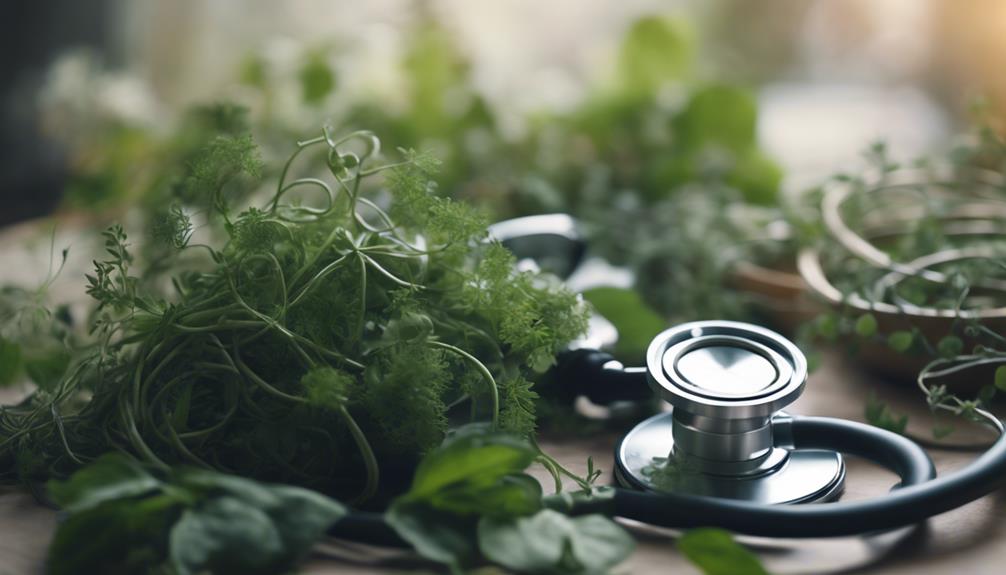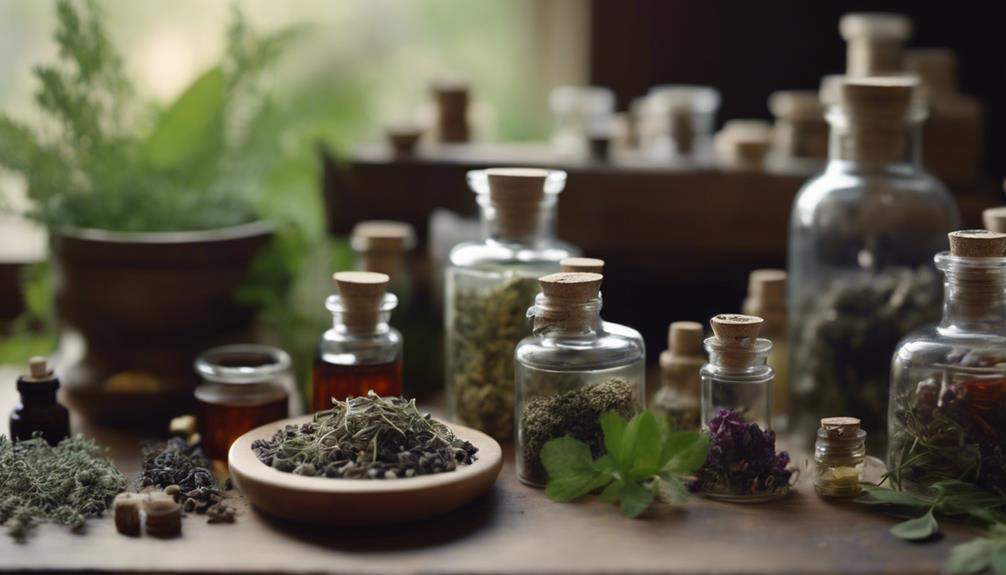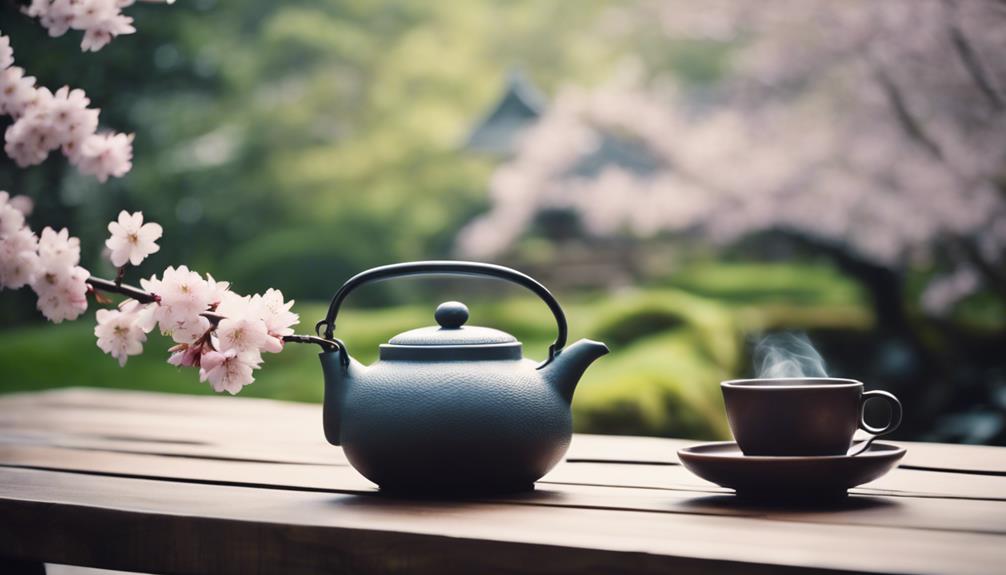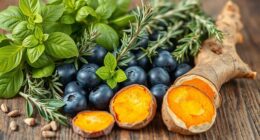We've been tapping into the natural healing power of plants for centuries through herbalism, a holistic approach to wellness that prevents and treats various health conditions. With a rich history and significant impact on modern medicine, herbalism offers a traditional approach to healthcare, with around 25% of pharmaceutical drugs derived from plant-based compounds. As we explore the world of herbalism, we'll discover its principles, types of remedies, and safety precautions, as well as its potential in addressing various health concerns – and there's more to uncover as we explore this ancient practice and its modern applications.
Key Takeaways
• Herbalism is a traditional practice that uses plants for health and wellness, emphasizing disease prevention and treatment.
• It offers a holistic approach, combining herbal remedies with nutrition, exercise, and mindfulness for overall balance and harmony.
• Herbalism is deeply rooted in ancient cultures, with approximately 25% of pharmaceutical drugs derived from plant-based compounds.
• This natural approach empowers individuals with self-care practices, addressing the root cause of illness through personalized treatment plans.
• Herbalism is gaining mainstream acceptance in modern medicine, with herbalists providing integrated healthcare services and expanding natural therapy options.
Understanding the Concept of Herbalism
Exploring the world of herbalism, it's important to grasp the fundamental concept that herbalism is a time-honored practice that utilizes the medicinal properties of plants to enhance health and well-being.
As we investigate the world of alternative medicine, we realize that herbalism is a traditional medicine that leverages the natural healing properties of herbs to prevent and treat diseases. This plant-based medicine has been practiced for centuries, with various cultures developing their unique traditional healing practices.
Significantly, approximately 25% of pharmaceutical drugs are derived from botanical sources, highlighting the significance of herbalism.
As we comprehend the concept of herbalism, we recognize its importance in providing natural remedies for various health issues. By harnessing the medicinal properties of plants, herbalism offers a holistic approach to health, making it an attractive option for those seeking alternative medicine.
As we continue to explore the world of herbalism, it's important to acknowledge its growing recognition in modern medicine, contributing to its mainstream acceptance.
History of Herbal Medicine Practices

As we explore the significance of herbalism in modern medicine, we're compelled to examine the rich history of herbal medicine practices that have shaped this traditional form of healing.
For centuries, herbal medicine has been an integral part of traditional medicine, with ancient cultures like Egypt, China, and Greece relying on herbal remedies to prevent and treat illnesses. Ayurveda, Traditional Chinese Medicine, and Native American medicine are just a few examples of traditional medical systems that heavily rely on herbal remedies.
Today, the World Health Organization estimates that 80% of the world's population uses herbal medicine for some aspects of primary healthcare. The rise of modern pharmacology in the 19th century led to the isolation of active compounds from plants used in herbal medicine, further solidifying its importance in modern healthcare.
Despite this, herbal medicine continues to be a popular choice globally, with a growing interest in natural and alternative health treatments. As we explore further into the world of herbalism, it's crucial to understand the historical context that has shaped this traditional form of healing.
Principles of Holistic Healthcare Approach

We adopt a holistic healthcare approach in herbalism, recognizing that peak wellness depends on the intricate balance of our physical, mental, emotional, and spiritual well-being. This approach is rooted in the understanding that each individual is unique, requiring individualized treatment that addresses the root cause of illness, rather than just its symptoms.
Here are the core principles of our holistic healthcare approach:
- Treating the whole person: We consider the interconnected systems of the body, promoting balance and harmony for utmost health.
- Prevention is key: We emphasize the importance of prevention through lifestyle changes, diet, and stress management to maintain well-being.
- Combining healing modalities: We often combine herbal remedies with other healing modalities like nutrition, exercise, and mindfulness practices to foster thorough healing.
- Empowering individuals: We educate individuals on self-care practices, enabling them to take an active role in their health and wellness journey.
Role of Herbalists in Modern Medicine

As we explore the role of herbalists in modern medicine, we find that they're playing a significant part in integrating natural therapies into conventional healthcare systems.
We're seeing herbal remedies being used in hospitals, and this shift is revolutionizing the way we approach healthcare.
Herbal Remedies in Hospitals
In many hospitals, herbalists are now working alongside medical professionals to provide patients with alternative treatment options that incorporate herbal remedies. As we explore the role of herbalists in modern medicine, it's clear that their presence in hospitals is becoming more prominent.
We're seeing herbalists collaborate with doctors to create personalized treatment plans, taking into account a patient's symptoms and medical history. This holistic approach to healthcare is becoming increasingly popular, as people seek natural therapies to complement traditional medicine.
Here are just a few ways herbalists are making a difference in hospitals:
- Providing personalized treatment plans: Herbalists work with doctors to create customized herbal remedies tailored to individual patients' needs.
- Conducting clinical exams: Herbalists identify root causes of illnesses, recommending herbal supplements as part of a thorough treatment plan.
- Offering integrated services: Some hospitals have incorporated herbalism into their services, providing patients with a more extensive range of treatment options.
- Expanding natural therapies: The role of herbalists in modern medicine continues to grow, as more people seek natural and alternative therapies for their health conditions.
Integrating Natural Therapies
Herbalists are revolutionizing modern medicine by integrating natural therapies that harness the power of plant-based remedies to treat the root causes of illnesses. We're not just talking about band-aid solutions; we're talking about getting to the heart of the matter. As herbalists, we focus on creating personalized herbal prescriptions tailored to each patient's unique needs. We choose herbs based on symptoms, perform clinical exams, and offer single or combined herbal treatments.
These treatments come in various forms, including teas, capsules, bath salts, oils, skin creams, and ointments. To become certified herbalists, we undergo rigorous training and clinical experience, with organizations like the American Herbalist Guild (AHG) requiring 400 hours of training. This ensures we're equipped to provide high-quality care.
Types of Herbal Remedies and Preparations

We've a multitude of options when it comes to incorporating herbal remedies into our wellness routines, with various forms catering to different needs and preferences.
Herbal remedies can come in various forms, including teas, capsules, bath salts, oils, and skin creams, all made from liquid or powdered herbs to address different health concerns.
Some of the most popular types of herbal remedies include:
- Herbal teas: a soothing way to ingest herbal remedies, perfect for relaxation and calming effects.
- Capsules: providing a convenient way to take herbal supplements in a controlled dosage.
- Herbal oils and creams: applied topically for skin conditions or muscle aches.
- Bath salts: a relaxing way to unwind and rejuvenate the body.
These preparations allow us to choose the best method for our individual needs, whether it's for stress relief, skin issues, or overall well-being.
Benefits of Using Herbal Medicine

Furthermore, by incorporating herbal medicine into our wellness routines, we can tap into a natural and effective way to address various health concerns without breaking the bank or risking harsh side effects.
We can benefit from the antioxidant and anti-inflammatory properties of many herbs, which promote overall health and well-being. Unlike pharmaceutical drugs, herbal remedies are often more affordable, making them accessible to a wider range of people.
Additionally, herbal medicine can be personalized to individual needs, taking into account factors like age, gender, and specific health concerns. The use of herbal medicine has a long history, dating back to ancient civilizations, showcasing its effectiveness and longevity as a healing practice.
Safety and Precautions With Herbalism

As we navigate the world of herbalism, we must recognize the significance of exercising caution when incorporating herbal supplements into our lives.
It's essential that we're aware of potential interactions with medications and the risk of allergic reactions, which can have serious consequences if not addressed properly.
Potential Interactions Warning
When taking herbal supplements, we must be mindful that they can interact with our prescription medications, leading to adverse effects or reduced effectiveness. It's important to consult with a healthcare provider before starting any herbal treatment to avoid potential interactions.
We need to be cautious, as some herbs can interfere with blood clotting, blood pressure, or hormone levels, which can have serious consequences.
Here are some potential interactions to watch out for:
- St. John's wort and antidepressants: St. John's wort can reduce the effectiveness of antidepressants and lead to serotonin syndrome.
- Garlic and blood thinners: Garlic can increase the risk of bleeding when taken with blood thinners.
- Ginkgo biloba and blood thinners: Ginkgo biloba can also increase the risk of bleeding when taken with blood thinners.
- Echinacea and immunosuppressants: Echinacea can reduce the effectiveness of immunosuppressants, which can lead to organ rejection in transplant patients.
To ensure safe treatment, we must inform our healthcare providers about our herbal supplement use and monitor ourselves for side effects.
Allergic Reactions Risk
We need to be aware that herbalism can trigger allergic reactions in some individuals, which can manifest as skin rashes, itching, or respiratory issues due to specific plant components. These symptoms can range from mild to severe, and in severe cases, require immediate medical attention. People with pollen allergies, for instance, may be more prone to reactions from herbal remedies.
It's important to consult with a healthcare provider before using herbal remedies if you have known allergies. When using herbalism, we should be cautious of potential allergic reactions, which can be triggered by specific plant components. If we experience any symptoms, it's vital to seek medical attention promptly.
The Future of Herbalism and Wellness

Herbalism's integration into holistic healthcare practices is positioned to transform the wellness industry, and we're on the verge of a transformative shift. As we move forward, herbalism is gaining recognition for its potential in addressing a wide range of health conditions. Research on standardized herbal extracts and combinations is paving the way for advanced herbal treatments. This progress is essential, as it will enable healthcare professionals to provide more effective and targeted care.
Here are just a few reasons why we're excited about the future of herbalism and wellness:
- Increased education: Herbal medicine is becoming a staple in medical and pharmacy schools, indicating a growing understanding of its benefits.
- Advanced research: Studies on standardized herbal extracts are revealing the full potential of herbal treatments.
- Improved accessibility: Quality herbal supplements are becoming more available, making it easier for people to incorporate herbalism into their wellness routines.
- Expert guidance: Consultation with experts and reputable manufacturers guarantees optimal dosages and high-quality products.
As we continue to explore the possibilities of herbalism, we're optimistic about the positive impact it will have on our overall wellness.
Frequently Asked Questions
What Does the Word "Herbalism" Mean?
We often come across the term 'herbalism' without fully grasping its meaning. So, what does the word 'herbalism' really mean?
In simple terms, it refers to the practice of using plants and their extracts for medicinal purposes. This encompasses creating remedies from herbs to treat various ailments and promote health.
At its core, herbalism is a holistic approach to healthcare that leverages natural remedies derived from plants.
What Is the Purpose of Herbalism?
We find that the purpose of herbalism is to provide natural and holistic alternatives to conventional medicine for healing and prevention.
By harnessing the healing properties of herbs, practitioners aim to address various health concerns and promote overall well-being.
We tailor herbal treatments to individual needs, understanding the root cause of ailments and providing personalized prescriptions to support wellness.
What Is the Practice of Herbalism?
We've got a treasure trove of knowledge about herbalism!
So, what's the practice of herbalism all about? Essentially, it's the art of harnessing the power of plants to prevent and treat illnesses.
Herbalists identify the root cause of health issues and craft personalized remedies using teas, capsules, oils, or skin creams.
It's a holistic approach that requires a deep understanding of botanicals and human health.
What Is the Original Meaning of the Word Herbalist?
We've dug up some interesting history about the term 'herbalist'.
Did you know that the original meaning of the word herbalist dates back to 1589? Back then, it referred to someone who practices healing with herbs or collects and grows them.
This definition has been associated with individuals engaged in herbalism and healing practices.
It's fascinating to see how the term has evolved over time, encompassing diverse backgrounds and practices.
Conclusion
As we explore the domain of herbalism, we uncover a rich history, holistic approach, and diverse range of remedies.
From ancient practices to modern applications, herbalism offers a unique perspective on wellness.
By understanding its principles, benefits, and precautions, we can harness the potential of herbal medicine.
As we look to the future, it's clear that herbalism will continue to play an essential role in our pursuit of wellness, providing a natural complement to modern medicine.










